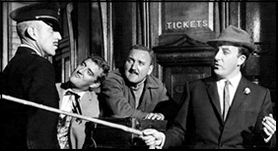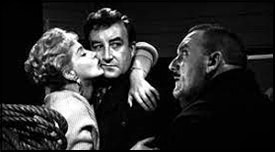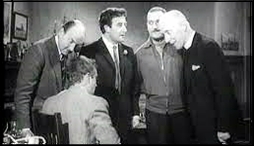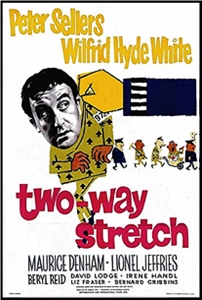Thu 5 May 2022
A Movie Review by David Friend: TWO WAY STRETCH (1960).
Posted by Steve under Films: Comedy/Musicals , Reviews[3] Comments
TWO WAY STRETCH British Lion Films, UK, 1960. Peter Sellers, David Lodge, Bernard Cribbins, Wilfrid Hyde White, Maurice Denham, Lionel Jeffries, Irene Handl, Liz Fraser. Director: Robert Day.

I don’t often review comedies on this blog – though I do love ’em – but I’m making an exception for this as it is both old and involves a crime. It’s basically Porridge fifteen years earlier, with Peter Sellers as crafty, cockney career criminal (and guest of Her Majesty’s) ‘Dodger’ Lane. He and his cell-mates ‘Jelly’ Knight (David Lodge) and Lenny the Dip (Bernard Cribbins) treat the prison like a hotel, with a newspaper and fry-up every morning.
The staff, meanwhile, are gullible and good-natured, with the governor (Maurice Denham) more interested in growing prize-winning vegetable marrows than keeping his convicts under control. Unsurprisingly, with such an easy life, Dodger and co have no wish to escape.
This, however, is just what their old conspirator ‘Soapy’ Stevens (Wilfred Hyde-White) asks them to do. Disguised as a gentlemanly prison chaplain, he recognises that the trio’s imprisonment affords them the perfect alibi and enlists their help in a diamond heist. All they have to do is break out of prison, carry out the theft and break back in again.

With the prison’s security almost non-existent, the plan is bound to succeed. However, a problem arrives in the shape of Dodger’s old nemesis, the irascible and sadistic prison warder ‘Sour’ Crout (Lionel Jeffries). With this guy around, there’s no way our trio can figure out a way to escape … surely?
Caper comedies were popular at this time with The Big Job (1965), Too Many Crooks (1959) and Make Mine Mink (1960) showing that we Brits may be rubbish criminals but do make pretty good comedies. This was one of the most popular British films on the year of release, and it’s easy to see why. Schoolboys, in particular, must have loved the silly fun found here, and Jeffries makes for a terrific pantomime villain as the gestapo-like Crout, screaming his lines (“Silence when you’re talking to me!â€) and sadistically determined to make every inmate suffer. There’s excellent support too from Liz Fraser and Irene Handl, the latter urging her son Lenny to escape jail like everyone else in their family.

The break-out attempts in the middle of the film tip the hat to both The Wooden Horse (1950) and Danger Within (1959), spoofing another popular genre of the time, though both are episodic and unsurprisingly focus more on comedy than logistical analysis. The eventual theft of the diamonds from an army vehicle is a little underwhelming, however, though Thorley Walters shows how he could have played Captain Mainwaring in Dad’s Army (a role in which he was considered).

This was probably the most casual performance Sellers ever gave, lacking as it does the multi-character revue of The Mouse That Roared (1959), Dr Strangelove (1964) and Soft Beds, Hard Battles (1974) or the intensity of I’m Alright, Jack (1959) and Being There (1979). It is also one of his most charming and accessible films, proving that not only Ealing could do Ealing.
Fans should also check out The Wrong Arm of the Law (1962) (another Sellers caper and something of a spiritual successor to this), POW spoof Very Important Person (1961) and, more recently, the starry but sadly neglected prison comedy Lucky Break (2001).
Rating: ****

May 5th, 2022 at 8:25 pm
It’s a delight, impeccable timing, but almost relaxed in its determination to win smiles over hysteria.
Even Sellers seems to be having fun in one of his comedies, just enjoying himself and taking us along.
May 6th, 2022 at 2:50 pm
In spite of a long career, I have a feeling that Peter Sellers is remembered today only for his Inspector Clouseau movies.
September 15th, 2022 at 3:10 am
re: msg #2 in this thread. Sad, it would be truly sad if public memory of Peter Sellers dims that low.
If I had to choose 5 of the TOP-most champion names in comedy (top-most for the entire 20th century), Sellers might probably count among them.
He not only had a long career …but what I recall most about him was his astounding fearlessness. Besides his audacious comedies –where he humiliates himself so painfully as to make one squirm –Sellers would take on even the most vile and unwholesome dramatic or villainous roles.
Who can forget Sellers as Claire Quilty in Kubrick’s “Lolita”? Who better to portray such a character?
Then also, “Dr. Strangelove” … “Chauncey Gardiner”. One of the most subtle and also most outlandish, and sheer baroque talents ever seen. My gosh. The laugh-out-out-loud scenes Sellers gave the world are innumerable.
In radio too: ‘The Goon Show’. Groundbreaking.
Question: these days, what –if anything? –persists in public memory for very long? Not much, I wager. It’s a goldfish society.
I miss the kind of world it was, which still had Peter Sellers in it. It may very well be that only, “The Pink Panther” has long-lasting staying power.
But what a horrible situation that is.